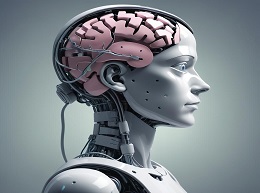AI and Mental Health: Applications and Ethical Considerations

In the intersection of artificial intelligence and mental health, a transformative journey unfolds. This article aims to delve into the applications of AI in mental health, shedding light on both the potential benefits and ethical considerations that arise when harnessing the power of technology to address the complexities of the human mind.
1. The Synergy of AI and Mental Health:
Embark on a exploration of how artificial intelligence is revolutionizing mental health care. Understand the potential of AI to augment diagnostic, therapeutic, and support systems.
2. AI in Diagnosis: Navigating the Landscape of Mental Health Assessment:
Explore how AI is reshaping the diagnostic landscape in mental health. Discuss the applications of natural language processing and machine learning in analyzing linguistic patterns for early detection of mental health conditions.
Example: AI algorithms analyzing text and speech patterns to identify signs of depression or anxiety in online communication.
3. Therapeutic Applications: AI as a Supportive Companion:
Delve into AI's role in providing therapeutic support. Discuss the development of chatbots and virtual assistants designed to offer mental health interventions, providing support and coping strategies.
Example: Woebot, an AI-powered chatbot offering cognitive-behavioral therapy techniques and emotional support to users.
4. Personalized Treatment Plans: Tailoring Mental Health Interventions:
Explore how AI is contributing to personalized treatment plans. Discuss the use of machine learning to analyze individual responses to interventions, enabling the customization of mental health care.
Example: AI algorithms analyzing patient data to recommend personalized mindfulness exercises or medication adjustments based on individual responses.
5. Predictive Analytics: Anticipating Mental Health Trends:
Delve into the realm of predictive analytics in mental health. Discuss how AI models analyze data to predict mental health trends, enabling proactive interventions and resource allocation.
Example: Predictive models analyzing demographic and environmental factors to identify communities at higher risk for mental health challenges.
6. Ethical Considerations: Balancing Progress with Safeguards:
Address the ethical considerations surrounding AI in mental health. Discuss concerns related to privacy, consent, bias, and the responsible use of sensitive information in AI-driven mental health interventions.
Example: Ensuring transparency and consent in AI applications that process sensitive mental health data, prioritizing user autonomy and privacy.
7. AI-Enabled Remote Monitoring: Revolutionizing Mental Health Care Access:
Explore how AI is enhancing remote mental health monitoring. Discuss the development of wearable devices and smartphone applications that leverage AI for continuous monitoring, improving accessibility to mental health care.
Example: Wearable devices using AI to detect changes in physiological indicators, providing early warnings for conditions like panic attacks or stress.
8. Addressing Bias in AI: Ensuring Equity in Mental Health Interventions:
Examine the importance of addressing bias in AI algorithms in the context of mental health. Discuss the potential impact of biased data on diagnostic and treatment recommendations and the ongoing efforts to mitigate such biases.
Example: Striving for diversity in training datasets to avoid biased recommendations that may disproportionately affect certain demographic groups.
9. The Future of AI in Mental Health: Bridging Gaps and Enhancing Well-being:
Discuss the potential future developments in AI and mental health. Explore how ongoing research and technological advancements may further revolutionize the field, providing innovative solutions and improving mental health care outcomes.
Example: Integration of advanced neuroimaging techniques with AI for more precise understanding and treatment of complex mental health conditions.
As AI continues to permeate the realm of mental health, the delicate balance between innovation and ethical considerations becomes paramount. Navigating this intersection requires a thoughtful approach to ensure that technological advancements align with the well-being and autonomy of individuals.
"Minds and Machines: Navigating AI in Mental Health" explores the transformative applications of AI in mental health. Delve into ethical considerations, unveiling the delicate balance between innovation and safeguarding well-being.